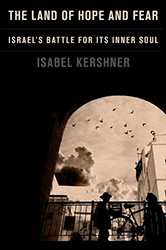Join us for a captivating exploration of culture and identity with Jewtina y Co., featuring acclaimed authors Jordan Salama and Ilan Stavans at the JCC Manhattan on Tuesday, October 22nd at 6:30 PM ET. Free tickets here!
Each of us has a family story that we believe defines us. But sometimes what we consider a powerful story turns out to be more myth than reality. This is the conundrum that Jordan Salama confronts as he shares his own family story.
One Thanksgiving, when Salama was in college, he discovered a book about his family history, called Historia Antigua, that had been compiled and written by his grandfather. Salama’s family immigrated to Argentina in the 1920s. His great-grandfather worked as a traveling salesman, and claimed to have left descendants — referred to as the lost Salamas — across the Andes. The author of our book decides to travel across Latin America in search of these relatives. It’s a journey of self-discovery that provides an intriguing description of Jewish life in Argentina.
Salama’s quest begins in Buenos Aires, where he receives a warm welcome from his grandfather’s family and friends. He details what it feels like to be in a country in which he possesses only a passing ability to communicate, making asking and answering questions difficult. And even when he can answer a question, his heavily accented Spanish makes it hard for his listener to understand him.
Salama’s ancestral roots are Sephardic, Syrian, Argentinian, and beyond. As he travels, he begins to realize how much of what he considered part of his Sephardic Jewish background also stems from the other cultures that influenced his family.
Along the way, Salama learns more and more about the turcos, or Jewish traveling salesmen, who were once so important to people in Patagonia. The locals relied on the salesmen to bring them materials and news of places that were far away. Turcos were typically first-generation immigrants who had come to Argentina years before Salama’s trip. By the twenty-first century, their descendants were likely to have brick-and-mortar shops and be established in their communities. In fact, according to Salama, Jewish involvement in the “rag trade” was so ubiquitous that many joked that “the eleventh commandment of the turcos is ‘you shall buy and sell clothes.’”
Salama collects stories of Jewish life from each of the people he meets throughout Patagonia, in the Andes, and elsewhere. He meets Isaac Oss, who carries his produce in a circular tin that he balances on his head. Year round, Isaac sells a sticky, flaky dough filled with raisins and nuts, as well as cookies and other pastries — foods that were adapted for Levantine Jews for Purim and Rosh Hashanah. He also meets Norma Susana Elias, whose unheated house gets its warmth from the people who visit and from her stew of white corn, beans, squash, and pumpkin in a meat-based broth.
Salama left New York to discover his lost relatives, but what he really learns about is himself. He discovers more about his background as a Sephardic Jew and his family history in both Syria and Argentina. He discovers that he has so much more in common with the many people he meets in Argentina than he ever expected he would as an American. Most importantly, he discovers how warm and welcoming people can be.
At the end of the book, Salama describes returning to Argentina for another trip, this time with his grandparents. He relates their excitement about coming back, meeting with relatives, and walking familiar streets. Because of Salama’s earlier, solo journey, Argentina has become familiar to him, too. While he admits that the family story about the lost Salamas was probably a myth, the feeling that Argentina has become home, and that he has family across Patagonia and the Andes, is his new reality.
Marian Stoltz-Loike, Ph.D. is author, speaker and academician. She is the author of Dual Career Couples: New Perspectives in Counseling and Cross-Cultural Communication.



